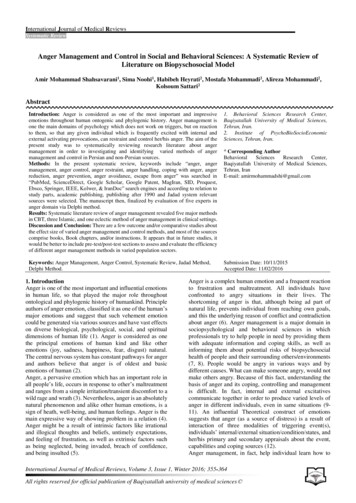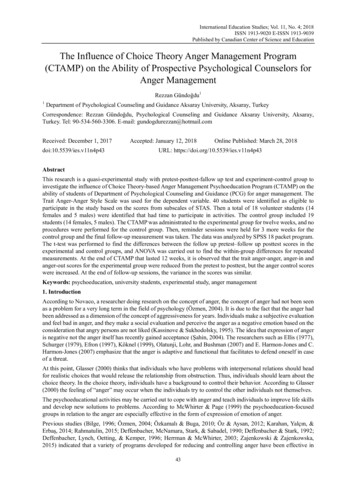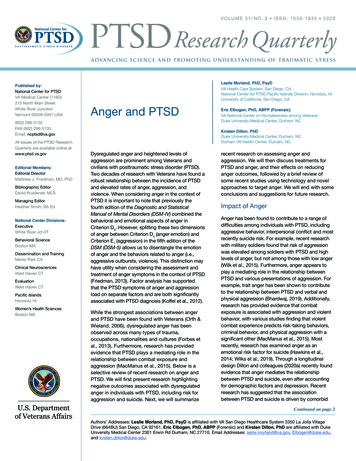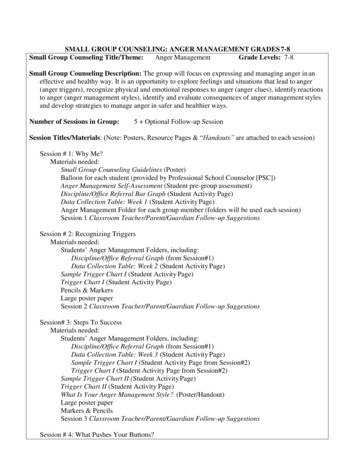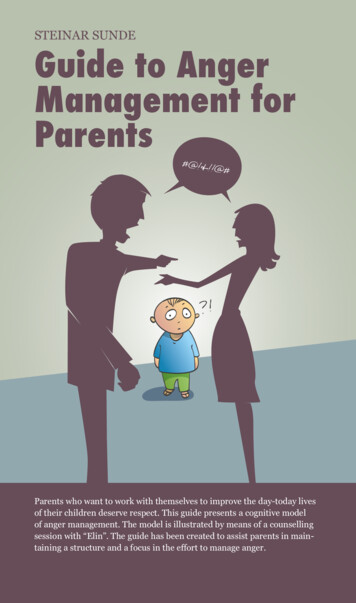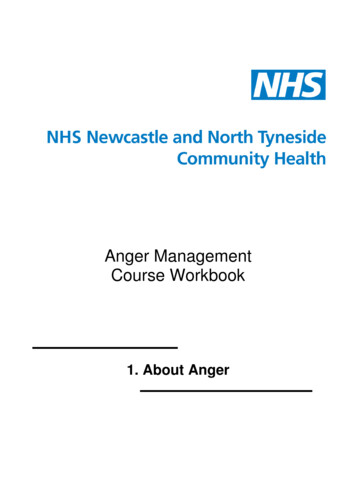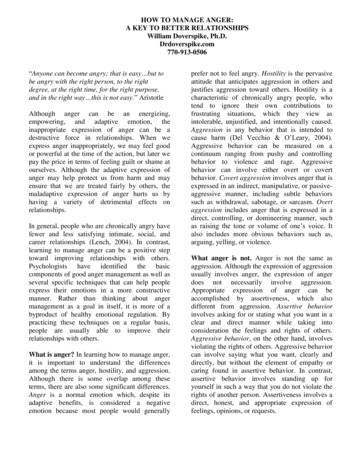
Transcription
HOW TO MANAGE ANGER:A KEY TO BETTER RELATIONSHIPSWilliam Doverspike, Ph.D.Drdoverspike.com770-913-0506“Anyone can become angry; that is easy but tobe angry with the right person, to the rightdegree, at the right time, for the right purpose,and in the right way this is not easy.” AristotleAlthough anger can be an energizing,empowering, and adaptive emotion, theinappropriate expression of anger can be adestructive force in relationships. When weexpress anger inappropriately, we may feel goodor powerful at the time of the action, but later wepay the price in terms of feeling guilt or shame atourselves. Although the adaptive expression ofanger may help protect us from harm and mayensure that we are treated fairly by others, themaladaptive expression of anger hurts us byhaving a variety of detrimental effects onrelationships.In general, people who are chronically angry havefewer and less satisfying intimate, social, andcareer relationships (Lench, 2004). In contrast,learning to manage anger can be a positive steptoward improving relationships with others.Psychologists have identified the basiccomponents of good anger management as well asseveral specific techniques that can help peopleexpress their emotions in a more constructivemanner. Rather than thinking about angermanagement as a goal in itself, it is more of abyproduct of healthy emotional regulation. Bypracticing these techniques on a regular basis,people are usually able to improve theirrelationships with others.What is anger? In learning how to manage anger,it is important to understand the differencesamong the terms anger, hostility, and aggression.Although there is some overlap among theseterms, there are also some significant differences.Anger is a normal emotion which, despite itsadaptive benefits, is considered a negativeemotion because most people would generallyprefer not to feel angry. Hostility is the pervasiveattitude that anticipates aggression in others andjustifies aggression toward others. Hostility is acharacteristic of chronically angry people, whotend to ignore their own contributions tofrustrating situations, which they view asintolerable, unjustified, and intentionally caused.Aggression is any behavior that is intended tocause harm (Del Vecchio & O’Leary, 2004).Aggressive behavior can be measured on acontinuum ranging from pushy and controllingbehavior to violence and rage. Aggressivebehavior can involve either overt or covertbehavior. Covert aggression involves anger that isexpressed in an indirect, manipulative, or passiveaggressive manner, including subtle behaviorssuch as withdrawal, sabotage, or sarcasm. Overtaggression includes anger that is expressed in adirect, controlling, or domineering manner, suchas raising the tone or volume of one’s voice. Italso includes more obvious behaviors such as,arguing, yelling, or violence.What anger is not. Anger is not the same asaggression. Although the expression of aggressionusually involves anger, the expression of angerdoes not necessarily involve aggression.Appropriate expression of anger can beaccomplished by assertiveness, which alsodifferent from aggression. Assertive behaviorinvolves asking for or stating what you want in aclear and direct manner while taking intoconsideration the feelings and rights of others.Aggressive behavior, on the other hand, involvesviolating the rights of others. Aggressive behaviorcan involve saying what you want, clearly anddirectly, but without the element of empathy orcaring found in assertive behavior. In contrast,assertive behavior involves standing up foryourself in such a way that you do not violate therights of another person. Assertiveness involves adirect, honest, and appropriate expression offeelings, opinions, or requests.
Consider Changing How You ThinkOur emotions are often determined by how wethink about things, and our thinking often createsproblems for us that the same kind of thinkingcannot solve. Because our emotional reaction to asituation is usually determined by ourinterpretation of the situation (conscious orotherwise), examining our thoughts can help usdetermine whether our interpretation of events isrealistic. Psychologists have identified severalcognitive strategies that can be helpful inimproving our emotional functioning. Usingeffective cognitive coping strategies can helpalleviate negative emotions by altering ourperception of ourselves and others (Lench, 2004).The following suggestions may be useful inimproving how you think about things.Examine unrealistic expectations. Unrealisticexpectations can serve as premeditatedresentments. If you don’t get what you want in asituation, it may be because your expectations arenot realistic. Unrealistic expectations can set thestage for disappointment, resentment, andfrustration. Good anger management requires selfexamination and the development of realisticexpectations in dealing with specific situations.Consider attribution errors in thinking. Angrypeople often magnify the focus on what happenedto them, while they minimize their owncontributions to a situation involving the otherperson. Angry people also tend to attribute theiranger to the personal characteristics of the otherperson while neglecting to consider situationalvariables that may have contributed to the otherperson’s behavior. Attribution errors involveperceiving the actions of others as indicative ofthe “kind” of person they are, rather than the kindof situations that may motivate their behavior. Toreduce attribution errors, a good place to start iswith a simple question, “What’s my part in it?”Consider an attitude adjustment. There are severalcognitive distortions and errors in thinking thatcan lead to negative emotions (Burns, 1999).Absolutistic thinking occurs when a thought isequated with reality. The underlying belief is, “If Ithink so, then it’s so.” This type of thinking leadsto rigidity, inflexibility, and lack of emotional andbehavioral freedom. A little attitude adjustmentcan go a long way toward better emotionalmanagement.Be aware of your feelings. People who lose theirtemper are often unaware of their underlyingemotions until they reach the boiling point. Goodemotional management requires increased selfawareness into the subtle nuances of emotions,including the ability to detect low levels of angersuch as irritability. Accurate identification andappropriate expression of low-level frustrationscan go a long way toward preventing the buildupof anger.Avoid emotional reasoning. While errors inthinking can lead to negative emotions such asanger, negative emotions can also lead to errors inthinking. Emotional reasoning occurs when afeeling is equated with reality. For example,emotional reasoning occurs when a personassumes that a situation is truly negative (e.g.,hopeless) just because he or she feels that way(e.g., sad).Be responsible for your emotions. Forget thoughtslike, “You make me mad.” It may be more honestto think, “I am making myself mad.” Focus onyourself rather than others. In other words,remember that you are the owner of youremotions, so take responsibility for your ownfeelings rather than blaming them on others.Quit trying to control others. Inappropriate angeris often related to attempts to control others. Learnto accept differences in the opinions andpreferences of others. Learn to take no for ananswer. Rather than attempting to control others,focus on controlling yourself.Place principles before personalities. Rather thanreacting to someone else’s personality, considerresponding on the basis of your own principles.Base your behavior on foundational moralprinciples such as beneficence (doing good forothers), nonmaleficence (avoiding doing harm toothers), honesty (being truthful), justice (beingfair with others), and fidelity (being faithful,keeping one’s promises, and honoring one’scommitments).
Notice the early warning signs. People who oftenlose their temper don’t see any early warningsigns because they usually don’t look for them.Before exploding into rage, most people do subtlethings like bite their lips, grit their teeth, roll theireyes, clench their fists, or make sighs. Noticingthese warning signs gives you a choice. As youbegin to identify your warning signs, you’llbecome able to learn earlier signs to help youbreak the behavioral chain of anger before youlose control.Use counting to increase your patience. A hastycomment is often one that is later regretted. It isusually easier to inflict harm by saying somethingthat shouldn’t be said than it is by not sayingsomething that should be said. Inappropriatecomments can often be prevented by simplyholding your tongue. If you don’t know what tosay, count to 10. If you do know what to say,count to 1,000.Consider the benefits of practicing of forgiveness.Forgiveness can be defined as the process ofletting go of negative emotions such as resentmentand anger. The key to understanding how to let gois contained in understanding how we hold on tonegative emotions in the first place. We usuallyhold on to resentment because of the interest—thepayoff. In other words, we get something out of it,even though at the same time it is destructive tous. As long as there is a payoff for holding on toresentment, forgiveness is impossible. Theinvestment in resentment ties us to the problem-and binds us to the person--through anger. Whenwe lose interest in the investment, we can learn tolet go of the anger. When we are able to let go ofour anger, we have taken a step towardforgiveness. In this context, forgiveness involvesletting go of anger. Forgiveness is a decision,which begins with the mind and goes to the heart.The benefit is primarily for us, rather than theother person.Consider Changing How You ActWhen we cannot think our way into better acting,we may be able to act our way into betterthinking. Psychologists have identified severalbehavioral strategies that can be helpful inimproving our relationships with others. Usingeffective behavioral coping strategies enables usto manage our behavior and express ourselves inways that encourage others to respond positively(Novaco, 2000). The following suggestions maybe useful in improving communication withothers.Use proactive rather than reactive behavior.Aggressive behavior is often reactive rather thanproactive in origin. Reactive behavior occurs inresponse to the external behavior of anotherperson, whereas proactive behavior involvestaking the initiative by acting on the basis ofinternal principles within oneself. Whetherthrough religion, counseling, or self-help reading,develop a set of principles to help you governyour behavior.Practice using assertive behavior. Anger cansometimes build up when we do not speak up forourselves when we are being harmed or when ourrights are violated by others. Chronically angrypeople tend to either suppress anger, which doesnot allow resolution of emotions, or they tend toexpress anger aggressively. Rather than beingsubmissive or aggressive, being assertive involvesstating what we want in a clear and direct mannerwhile taking into consideration the feelings andrights of others. When we act assertively, we takecontrol of our actions and accept responsibility forourselves while respecting the rights of others.Consider opposite action. Sometimes our feelingscan result in escalation of a tense situation. Insuch times, it is often helpful to consider theactions that are opposite of our natural response.Rather than moving toward, consider steppingback. Rather than standing, consider sitting down.Rather than talking louder, consider a lower toneof voice. Rather than puffing up, considerrelaxing.Listen and learn. Good communication is 90%listening. Limit your own talking, because youcan’t talk and listen at the same time. If you arethinking about what you are going to say next,then you are not listening.Avoid asking “why” questions. In general,statements that begin with the word “why” aremore likely to be perceived by the other person as
indictments or blaming statements. Instead ofasking “why” questions, consider asking “how”questions.Avoid using “you” language. In general,questions that begin with the word “you” are morelikely to be perceived by the other person asaccusatory indictments rather than communicationfacilitators. Rather than making “you” statements,which place blame on the other person, considermaking “I” statements, which place responsibilityon you.Avoid stockpiling resentments. When feelingangry about a specific situation, some people tendto bring up a stockpile of resentments from thepast. Throwing in the kitchen sink can bring upthe other person’s defenses to a new level. Stickto the present discussion at hand, and avoidbringing up the past.Be responsible for your actions. Forget commentslike, “You made me do it.” Replace blamingothers with taking responsibility for everythingyou say and do. You are the owner of your ownmouth, so take responsibility for everything thatcomes out of it.Treat others with respect. One of the best ways tobe respected is to be respectful to others. Whenthe other person is speaking, make eye contact,listen carefully, and don’t interrupt. Don’t sigh,make faces, or roll your eyes. Pass upopportunities to attack, insult, or criticize the otherperson.Offer no resistance when criticized. Whencriticized, consider coping with the criticism byoffering no resistance. In other words, avoidoffering any hard psychological striking surfacesto the other person’s statements. Instead, agreewith any truth in the criticism. Agree in principlewith any statement that you can. In other words,become like a fog bank, which does not fight backor offer resistance to penetration.Let negative assertions work for you. Whencriticized, there is a natural tendency to responddefensively by denying the matter or offering acounter-criticism. Instead of defending yourself,assertively accept those things that are negativeabout you. In other words, accept any kernel oftruth in what the other person is saying. If you arenegatively assertive about yourself, you cannot bemanipulated by the other person through feelingsof guilt or anxiety.Respond by inquiring for more. When criticized,actively prompt further criticism about yourself orthe perceived wrongdoing by requesting specificinformation in a thoughtful, reflective manner.This response requires the use of radicalacceptance rather than denial, defensiveness, orjustification. Radical acceptance involves theconscious effort to not only accept, but also toactively welcome, any and all critical commentsfrom the other person---no matter how odd,disturbing, or provocative they may be.Responding by asking for more negatives maydecrease the potential for manipulative criticismon the part of the other person.Avoid the harsh startup. When a discussion startswith criticism or sarcasm (a form on contempt), ithas begun with what is termed the “harsh startup.”The most obvious indicator that a conflictdiscussion—and marriage—is not going to gowell is the way it begins. Statistics tell the story:According to Gottman and Silver (1994, 1999),96% of the time, the outcome of a conversationcan be predicted on the basis of the first threeminutes of the interaction. If the discussion beginswith a harsh startup, it will inevitably end with anegative outcome.Consider using the gentle startup. Also known asa softened startup, this approach to dialogue isbasically the way we treat guests—with courtesyand respect. It is basically the opposite of theharsh startup. According to Gottman and Silver(1994, 1999), the gentle startup involves sixcomponents or rules:1. Start the conversation gently; it is okay tocomplain but not to blame.2. Make statements that start with “I” insteadof “you.”3. Describe what is happening; don’tevaluate or judge.4. Talk clearly about what you need inpositive terms.5. Be polite and respectful.6. Give appreciations.
Be Aware Of Your Body LanguageIn some situations, what we say is not asimportant as how we say it. Remember theproverb, “A soft answer turns away wrath: butgrievous words stir up anger” (Proverbs 15: 1). Inconflict resolution, process (how something issaid) is sometimes more important than content(what is said). The process of communicationinvolves how we speak with our body language.The following guidelines may be useful inmonitoring how you are speaking with your bodylanguage.Maintain appropriate eye contact. Glaring orstaring directly at another person can be a subtleway of attempting to push, control, or pressure.Although it is generally a good idea to look at aperson who is speaking, too much eye contactwhen responding can sometimes be perceived asintimidating. Good communication involves abalance between maintaining and restraining eyecontact.Remember body posture. To use a term in boxing,“leading with the chin” can be a way of invitingaggression rather than good communication.Although a raised chin adds to a dominantposture, dominance does not necessarily add togood communication.Be aware of facial expression. An angry scowlcan add fuel to the fire, whereas a simple smilecan often defuse aggression. Have you ever seenanyone trying to express anger while smiling orlaughing?Monitor voice tone, inflection, and volume. Aloud, sarcastic, or shouted response will raise theother person’s defenses. On the other hand, awell-modulated statement can be convincingwithout being controlling or intimidating. Talkslowly, quietly, and calmly.Minimize hand gestures. Like too manyexclamation points in a paragraph, overenthusiastic gestures can be a distraction. Instead,good communication involves appropriategestures.Avoid finger pointing. Pointing or waving a fingerat another person is a nonverbal indictment.Rather than pointing, stick to the point whentalking.Avoid touching when angry. As a general rule, itis a good idea to avoid touching the other personwhen you are angry. Otherwise, the other personis likely to perceive your gesture as pushy,controlling, or aggressive.Take a break when angry. As a last resort, if youare about to explode, take a break until you cancool down and talk in a calm manner. However,simply walking away and slamming the doorwon’t work. Taking a break is different thanrunning away. Calmly tell the other person thatyou’re too upset to talk, that you’d like to take abreak, and promise to return when you can talkwithout losing your temper. Go back only whenyou are ready to talk calmly. Otherwise, you arejust setting yourself up for another round of fights.Practice Good Communication On A DailyBasisGood communication is more than usingstrategies and techniques. Good communicationrequires taking responsibility for your ownfeelings and behaviors. It involves increased selfawareness, learning new ideas, practicing throughrole-playing, and experimenting with new ways ofinteracting and communicating with others. Bypracticing these principles on a regular basis, youwill be able to improve your relationships withothers. While many people can learn betteremotional management on their own, the processcan often be facilitated by consulting apsychologist who has training and experiencewith these principles.
ReferencesBurns, D. (1999). The feeling good handbook(rev. ed.). New York, NY: Plume.Del Vecchio, T., & O’Leary, K. (2004).Effectiveness of anger treatments forspecific anger problems: A meta-analyticreview. Clinical Psychology Review, 24,15-34.Gottman, J., & Silver, N. (1994). Why marriagessucceed or fail: What you can learn fromthe breakthrough research to make yourmarriage last. New York, NY: Simon &Schuster.Gottman, J. M., & Silver, N. (1999). The sevenprinciples for making marriage work. NewYork, NY: Three Rivers Press.Lench, H. (2004). Anger management: Type A:behavior revisited. Texas Heart Journal,20, 143-151.Novaco, R. W. (2000). Anger. In A. Kazdin (Ed.),Encyclopedia of psychology (pp. 170-174).Washington,D.C.:AmericanPsychological Association.Copyright 2009 by William F. Doverspike, Ph.D.Last updated 2022The correct citation for this article is Doverspike, W. F.(2009, May). Anger management: A key to betterrelationships. http://drwilliamdoverspike.com/
What anger is not. Anger is not the same as aggression. Although the expression of aggression usually involves anger, the expression of anger does not necessarily involve aggression. Appropriate expression of anger can be accomplished by assertiveness, which also different from aggression. Assertive behavior
